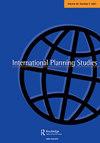The Socio-politics of the urbanization - transportation nexus: infrastructural projects in the department of Antioquia in Colombia through the lens of technological politics and institutional dynamics
IF 1.5
Q4 REGIONAL & URBAN PLANNING
引用次数: 5
Abstract
ABSTRACT Development of transportation infrastructure has long been seen as a fundamental tool in shaping cities, and vice versa. However, moving beyond the discussion on the causalities of transportation infrastructure and urbanization, various authors have criticized infrastructural projects for promoting injustice and reinforcing social and spatial polarization by supporting profit-oriented developments. Contributing to this line of thought, this study examines the wider Socio-politics of the transportation – urbanization nexus in infrastructural projects associated with urban development in the department of Antioquia in Colombia. It focuses on the relationships between these projects and urban development approaches and policies, addressing the socio-political benefits and profit-oriented interests of hegemonic groups, and how infrastructures embody specific forms of power and authority of these groups. The analysis mobilizes a combination of the theory of technological politics and a strategic-relational institutionalist approach, which draws attention to the momentum of large-scale sociotechnical systems, and to the response of modern societies to specific technological imperatives.城市化-交通关系的社会政治:通过技术政治和体制动态的镜头在哥伦比亚安蒂奥基亚省的基础设施项目
长期以来,交通基础设施的发展一直被视为塑造城市的基本工具,反之亦然。然而,除了讨论交通基础设施和城市化的因果关系之外,许多作者批评基础设施项目通过支持以利润为导向的发展,促进了不公正,加剧了社会和空间的两极分化。为了促进这一思路,本研究考察了哥伦比亚安蒂奥基亚省与城市发展相关的基础设施项目中交通-城市化关系的更广泛的社会政治。它侧重于这些项目与城市发展方法和政策之间的关系,解决霸权集团的社会政治利益和利润导向的利益,以及基础设施如何体现这些集团的特定形式的权力和权威。该分析动员了技术政治理论和战略关系制度主义方法的结合,将注意力集中在大规模社会技术系统的势头上,以及现代社会对具体技术要求的反应上。
本文章由计算机程序翻译,如有差异,请以英文原文为准。
求助全文
约1分钟内获得全文
求助全文
来源期刊

International Planning Studies
REGIONAL & URBAN PLANNING-
CiteScore
4.60
自引率
4.80%
发文量
20
期刊介绍:
Planning, at urban, regional, national and international levels, faces new challenges, notably those related to the growth of globalisation as both an objective socio-economic process and a shift in policy-maker perceptions and modes of analysis. International Planning Studies (IPS) addresses these issues by publishing quality research in a variety of specific fields and from a range of theoretical and normative perspectives, which helps improve understanding of the actual and potential role of planning and planners in this context.
 求助内容:
求助内容: 应助结果提醒方式:
应助结果提醒方式:


